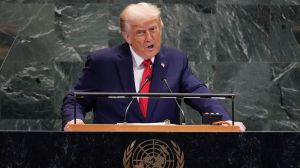Aiyar chalks out safe route for gasline
With the international community turning the heat on Iran, Petroleum Minister Mani Shankar Aiyar is proposing that the Iran-Pakistan-India g...

With the international community turning the heat on Iran, Petroleum Minister Mani Shankar Aiyar is proposing that the Iran-Pakistan-India gas pipeline be individually built by each of the three nations in their own territory.
This option would not only help New Delhi avoid a face-off with the United States but also protect the project from international sanctions. ‘‘This could moderate US unhappiness with the project,’’ reads Aiyar’s proposal that seeks government approval to negotiate and finalise a framework agreement where India would be purchasing the Iranian gas at its border.
This model would also enable American consultants and contractors to participate in the project segments being executed in Pakistan and India, it said. The consortium approach, Aiyar’s first choice while seeking Cabinet approval last February, has been discarded for fear that it could be a non-starter due to US opposition and possible unhappiness of the Pakistani and Iranian partners.
‘‘Such a large corporate entity handling one of the world’s most valuable projects from which US firms would be ab initio excluded, would almost certainly encourage the US Administration to vigorously oppose the project politically and legally, including with the threat of invoking sanctions under ILSA that otherwise has not been invoked even once since it was passed in 1996,’’ it said.
Incidentally, the consortium approach where state-run firms of each country would hold equal equity in the pipeline-building company has ‘‘obvious advantages for the project from the perspective of India’s interests’’.
The individual country route would require that Tehran sign two bilateral agreements: One with India to determine the terms and conditions on which the gas will be delivered by Iran at the India-Pakistan border; and the second with Islamabad setting out the terms and conditions of the transit arrangements through Pakistan.
India is depending on these pacts, based on international best practice, to safeguard its interest. The agreement with Iran is expected to ensure sustained gas supply through Pakistani territory with provisions pertaining to ‘‘Supply or Pay’’ and alternative supplies by Iran in case of disruptions.
It is hoping that the Iran-Pakistan agreement would regulate gas transit through Pakistan with obligations on Islamabad to ensure safe and secure transport of the gas by extending full protection to the pipeline. It would also contain ‘‘effective disincentives’’ for Pakistan to interrupt or disrupt the gas supply to India in any manner or at any time.
Another safety arrangement being advocated by Aiyar is to set up three monitoring bodies that would coordinate the project in the three countries even as the pipeline itself would be executed separately.
In this case, Iran would be responsible for ensuring gas supply safety and security but it would make India entirely dependent on Iran’s ability to ensure that Pakistan fulfills its obligations.
Photos



- 01
- 02
- 03
- 04
- 05




























